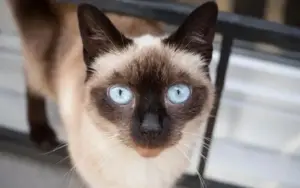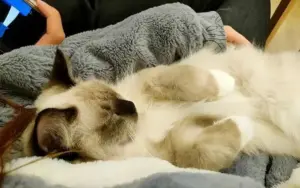Why do cats sleep so much?
Does your cat sleep at a normal time?
How much sleep do cats need, and could too much sleep be a sign of a serious health problem?
This article will take you through the answers to all your questions about your cat’s sleep behavior and patterns.
Table of Contents
Why do cats sleep so much?
Just like us, cats need sleep to stay alive. Regular sleep recharges and restores the body for the next day, while supporting memory function and the immune system.
Different types of sleep, including NREM and REM, support different functions of the body. Cats have evolved to sleep for long periods of time during the day. Doing this allows them to conserve energy that they would use in the wild to hunt, chase, and find their next meal.
After all, cats are born hunters (their hunting instinct is one of the main reasons why cats run away from home).
Since cats in the wild are often both predators and prey, they need a lot of energy to hunt and bring back their next meal, while remaining vigilant to avoid becoming a snack. Even the most domesticated cats are still driven by this ancient biological programming. As a result, cats tend to be lighter sleepers than humans, taking multiple naps throughout the day rather than one long, deep sleep at night.
How much do cats sleep?
Cats are sleepy creatures, and your furry family member is probably curled up in a ball for a nap right now. It may seem like your furry friend is sleeping all day long, but how much do cats really sleep? As for the exact number of hours your cat sleeps, it depends on factors such as:
- Age: Older cats have less energy and spend more time sleeping than younger cats. Kittens, like babies, need a lot of sleep to grow.
- Activity level: Cats often need more sleep after experiencing high-intensity activity.
- Health conditions: If your cat has a medical condition, such as feline dementia, their sleep cycles may be affected.
How many hours do cats sleep a day?
Cats typically sleep between 12 and 20 hours a day, according to veterinary experts. The average sleep duration is 15 hours, with 40% of cats sleeping more than 18 hours a day. Yes, cats sleep about 2-3 times more than people. As they age, cats tend to sleep for more hours each day. Unlike us, our feline friends are polyphasic sleepers. This means cats take multiple naps throughout the day rather than one long sleep. This explains why your cat may not sleep through the night like you do. Instead, cats typically nap multiple times throughout the day, usually lasting 50 to 113 minutes each time.
How long do newborn kittens sleep?
Newborn kittens need more sleep than adult cats. Once they are born, it is fairly common for them to spend most of their time sleeping. Little furballs need as much sleep as possible or they won’t grow! During the first few weeks of life, kittens sleep almost constantly. They may occasionally wake up to nurse with their mother cat. As they age, they are able to stay awake longer, but even as they continue to grow, kittens will still sleep most of the time.
Typically 16 to 20 hours, but as cats age, they sleep less each day.
Cat’s favorite place to sleep
Cats are quite picky when it comes to choosing where to nap. They may prefer a sunny windowsill, bookshelf, or even your bed. Cats generally feel safer where they have a high vantage point overlooking their surroundings. Or even better if they can sleep somewhere quiet, peaceful and familiar. (It’s best to have your scent, like your bed.) So, if you want to place a basket or blanket for your cat, choose a quiet corner of your bedroom or living room. Make sure the room is at the right temperature and has a comfortable surface. Yes, if your cat is found in bed with you, it is a sign that they love and trust you.
Do cats dream?
Yes! Just like humans, cats go through different sleep stages. During the rapid eye movement (REM) stage, cats are in a state of deep sleep and can dream. When your cat is dreaming, you may observe their muscles twitching—or even hissing or meowing. It’s very funny and cute when a cat looks like it’s chasing a mouse in its sleep. And, if your cat friend is able to enter a dream-like state of sleep, it’s a sign that they feel safe and secure around you.
So at this point, you might be wondering: What do cats dream about? Unfortunately, it remains a secret for now. Researchers aren’t 100 percent sure what cats might be thinking about while they sleep. But just like humans, it’s possible that cats can process the events they’ve just experienced. So just like dogs, they too can experience dream sleep – your cat might also dream about you (and your happy times together) Think your cat might be experiencing a nightmare? It is best not to wake them when they are in deep sleep. This is an important stage of sleep when your cat’s body is repairing and recovering. Therefore, waking them up during this stage may interrupt the cell renewal process. Instead, we recommend waiting for your cat to wake up on their own—and giving them plenty of cuddles and petting once they wake up. Your presence is enough to overcome any nightmare.
Are cats nocturnal animals?
When their cats don’t sleep at night, many cat parents begin to wonder if their cats are nocturnal. But this is actually a fallacy; cats are diurnal animals, not nocturnal animals. This means they are most active at dawn and dusk. This behavior is based on their hunting behavior, as cats in the wild tend to prey on animals that are also most active around these times. So if you’re worried about your cat moving around at night, remember that they’re better adapted to the dark than you are. If your cat is keeping you awake at night, here are some things you can try:
Don’t reward them, play with them, feed them, or give them attention.
- Help them get enough play and exercise before bed.
- If you are not home during the day, provide stimulation while you are away.
- Put your cat in another room at night so it doesn’t disturb you.
- Avoid punishing your cat for its disruptive behavior.
Cats’ desire to prey is one of the main reasons why cats run away from home – especially after dark outside.
Does my cat sleep too much?
Changes in sleep patterns may be normal, but they may also indicate illness. If you notice that your cat is sleeping more than usual and is also exhibiting other concerning behaviors, such as not eating, this may indicate a serious health problem.
Cats may sleep more than usual if they have:
- obesity
- kidney disease
- deafness
- hypothyroidism
- malnutrition
- old
- cat dementia
- feline depression
- infection
- diabetes
- osteoarthritis
- poisoning
For example, one of the first signs that older cats may develop cognitive dysfunction syndrome (CDS) is changes in sleep patterns. And because cats are good at hiding their illnesses, you may miss the signs until it’s too late. A sick cat may stay away from home to deal with the illness on his own, or may simply avoid you.
Cats don’t get enough sleep
Likewise, if you are concerned that your cat is sleep-deprived, pay attention to your cat’s behavior and contact your veterinarian if necessary. Some medical conditions may cause cats to sleep less than normal, including:
- Hyperthyroidism
- High blood pressure
Feline Immunodeficiency Virus (FIV)
Lack of stimulation can be another reason cats don’t get enough sleep, especially if they are overly active at night. Providing more activities, games and outdoor exercise can help them sleep better.
How long should my cat sleep?
As we mentioned above, cats typically need anywhere from 12 to 20 hours of sleep per day. Kittens and older cats generally need more sleep than healthy adult cats. Talk to your veterinarian to find out how long your cat should sleep. You can then spot if there are any abnormalities in their sleep patterns and identify health problems early on.
If your cat is sleeping less than 12 hours a day, or more than 20 hours a day, or if their sleeping habits suddenly change, talk to your veterinarian. You should also consult your veterinarian if your cat has trouble waking up easily, or shows any other signs of illness. When it comes to your cat’s health, it’s better to be careful than sorry.









Add comment